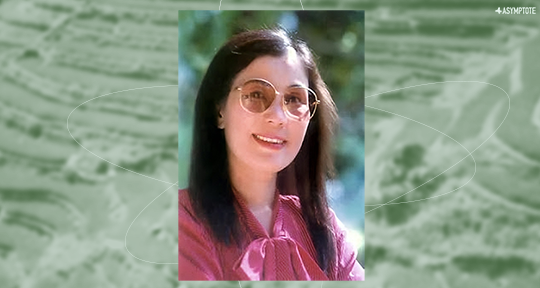In this essay, Thuy Dinh, one of the translators of Vietnamese poet Lâm thị Mỹ Dạ, remembers and reflects on the visual beauty, delicate music, and subtle dissonances of her work, in light of her recent passing.
On July 6, 2023, Lâm thị Mỹ Dạ, one of Vietnam’s major poets whose poetry was featured in Asymptote’s July 2013 issue, passed away in Saigon, Vietnam, due to complications from Alzheimer’s. She was 74.
An author of several acclaimed poetry collections and children’s stories, Mỹ Dạ attended the Nguyễn Du Writing School in Hà Nội in 1983 and Russia’s Maxim Gorky Institute of Advanced Studies in Literature in 1988. In 2007, she was awarded the National Prize in Literature and the Arts ⸺Vietnam’s highest literary honor ⸺ for her three poetry collections: Trái Tim Sinh Nở (The Blossoming Heart), Bài Thơ Không Năm Tháng (Poems Without Years), and Đề Tặng Một Giấc Mơ (Dedicated to a Dream). Her last two collections, Soul Brimming with Wild Chrysanthemums (Hồn Đầy Hoa Cúc Dại) and The Love Poems of Lâm thị Mỹ Dạ (Thơ Tình Lâm thị Mỹ Dạ) were also published in 2007. In the U.S., Green Rice, an anthology of Mỹ Dạ’s select poems, co-translated by poet Martha Collins and myself, represents her poetic legacy in translation.
I first met Mỹ Dạ in the summer of 2000 in Boston, Massachusetts, when she came to the William Joiner Institute as part of an invited four-member delegation of writers from Vietnam. I had come to the Institute that summer to attend workshops in translation and creative nonfiction; serendipitously, Martha, who taught the translation workshop, was looking for a Vietnamese co-translator to work with her on an anthology of Mỹ Dạ’s poetry. I happily embarked on this project, sensing that this collaboration—besides being my first major translation project⸺would also give me an immersive opportunity to study an important female poet from “the other side.” As a young writer whose family had been airlifted out of Saigon by U.S. military personnel near the end of the Vietnam War, I knew very little at the time about literature from the Communist perspective. We were still in the early years of the internet, and barely five years into the normalization of U.S-Vietnam relations.
Most of all, I was drawn to the prospect of translating Mỹ Dạ’s work by the voice of the poet herself—a voice that I have found, in person and through her writing, to be artlessly nuanced. I was born in the south, years after the 1954 separation of North and South Vietnam, but have remained deeply attuned to my family’s Hà Nội accent; as such, I had to learn to decode Mỹ Da’s voice. Her melodious Central Vietnamese cadence gradually revealed a mordant sense of humor that was not too different from my late maternal grandfather’s Northern brand of sarcasm. In my memory, Mỹ Dạ’s speech takes on the resonance of wind chimes, softly rolling pebbles, and rustling waves. READ MORE…

